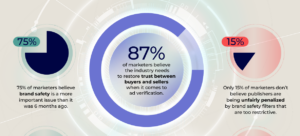Over half (51%) of Brits currently worry about losing access to the websites and apps they use behind a paywall, according to research released by global advertising platform The Trade Desk.
About two-thirds (65%) already consume news or current affairs for free, and over three quarters (77%) start looking for free articles when they reach an article behind a paywall, thereby preventing publishers from earning vital income in a paywall paradox.
This comes as the vast majority (88%) of Brits would like to consume as much free online content as possible – and many even break the rules to do so. The findings reveal a third (34 percent) of people surveyed claim to be using services that allow them to get behind paywalls without paying for the privilege.
Phil Duffield, VP UK at The Trade Desk, commented on the findings: “Consumers want to maintain access to the free content they know and love. As an alternative to paywalls, they need an advertising experience that benefits everyone – consumers, brands and publishers. But the current offer is often falling woefully short of that. With cross-channel identity solutions such as the open-source EUID and single sign-on authentication tools like OpenPass in the market, publishers can claim back the control of their own monetisation, while reshaping the internet that’s an improvement on the consumer ad experience.”
The good news for advertisers and publishers is that almost nine in ten (87%) of UK consumers surveyed would be happy to pay for content with their data in some way, propping up the value exchange of free content in return for relevant advertising. Of these, over a quarter (26%) would rather pay with their data if they can control what data is collected and shared, and by what methods. According to the research, (27%) said they are willing to pay with their data as long as they can’t be identified, and the data is used in a privacy-safe way.
All figures are based on a consumer survey conducted by Appinio on behalf of The Trade Desk Intelligence. Fieldwork was undertaken between March 22 – April 4 2024 amongst 1,500 UK adults.












